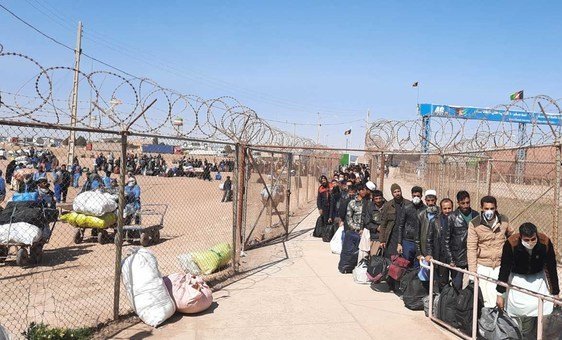The UN International Organization for Migration (IOM) and humanitarian partners are providing critical aid at border crossing points between Pakistan and Afghanistan in the face of a surge in forced returns of Afghan nationals.
According to IOM, in the past two months alone, nearly 375,000 Afghans left Pakistan, primarily utilizing the Torkham and Spin Boldak border crossings, near Kabul and Kandahar, respectively.
The number of daily border crossings has skyrocketed from 200 to a staggering 17,000, creating an unprecedented strain on resources and infrastructure.
Desperate situation
“Their situation is desperate; most people told us they were forced to leave the country and leave belongings and savings behind,” said Maria Moita, IOM Afghanistan Chief of Mission.
“People arriving in Afghanistan are extremely vulnerable and need immediate support at the border as well as for the long term in the areas of return,” she added.
The crisis has unfolded following Pakistan’s implementation of the “Illegal Foreigners’ Repatriation Plan,” which set a 1 November deadline for the “voluntary return” of all undocumented Afghans in Pakistan to their home country.
Response efforts
Critical aid, encompassing shelter, water, sanitation, essential household items, healthcare, protection, nutrition services, and cash assistance for basic needs, transportation, and food, are being delivered by an IOM-led border consortium.
However, the surge in forced returns has necessitated the establishment of larger reception centres to provide assistance to returning Afghans before they proceed to their intended areas of return.
“This is a significant humanitarian crisis and funds are urgently needed to continue providing immediate assistance after arrival to ensure a safe and dignified return,” said Ms. Moita.
Urgent support needed
As the crisis unfolds, the border consortium has launched an initial appeal for support, anticipating the need for a revision and additional resources. The situation is particularly challenging for women and girls in Afghanistan, and with winter approaching, the need for international support is even more urgent.
After decades of conflict, instability and economic crisis, Afghanistan will struggle to absorb the high number of returning families, many of whom have not lived in the country for decades if ever, according to IOM.
“With over six million people already internally displaced throughout the country, Afghans returning from Pakistan face a precarious, uncertain future,” the agency said.
Afghanistan currently has the third-largest number of internally displaced people globally.

